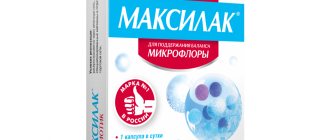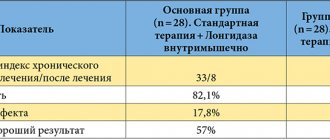Compound
| Capsules | 1 caps. |
| active substances: | |
| lyophilisate of probiotic bacteria* | >4.5 109 CFU |
| fructooligosaccharides (prebiotic component) | 63 mg |
| excipients: microcrystalline cellulose; magnesium stearate; silica; titanium dioxide; hypromellose | |
| *Contents of components in a daily dose (see table) |
Table
| Component | Amount per daily serving: 1 capsule. weighing (325±16.3) mg |
| Active substances | |
| Probiotic microorganisms | |
| Bifidobacteria | |
| Bifidobacterium longum | 6.75 108 CFU |
| Bifidobacterium breve | 4.5 108 CFU |
| Bifidobacterium bifidum | 2.25 108 CFU |
| Total | 1.35 109 CFU |
| Lactobacilli | |
| Lactobacillus acidophilus | 9 108 CFU |
| Lactobacillus rhamnosus | 4.5 108 CFU |
| Lactobacillus plantarum | 2.25 108 CFU |
| Lactobacillus casei | 2.25 108 CFU |
| Total | 1.8 109 CFU |
| Lactic acid microorganisms | |
| Lactococcus lactis | 9 108 CFU |
| Streptococcus thermophilus | 4.5 108 CFU |
| Total | 1.35 109 CFU |
| Excipients | |
| Fructooligosaccharides | 63 mg |
Which is better Maxilac or Baktistatin
Baktistatin, unlike Maxilac, contains not only bacteria beneficial to the intestines, but also a sorbent. This suggests that in case of poisoning and intestinal infections, it is more reasonable to use Baktistatin. It introduces strains of beneficial bacteria into the affected digestive system and, using a sorbent, collects and removes toxins that lead to a worsening of the condition. The third important component of Baktistatin is a set of metabolites - enzymes that facilitate the task of the pancreas and liver. Once in the duodenum, Baktistatin enzymes break down fats and proteins, relieving the load on the digestive organs.
The disadvantage of Baktistatin is the release form - these are capsules, and children under 6 years old cannot take this drug. In addition, Bactistatin is prohibited for use by pregnant and lactating women.
Characteristic
Dietary supplement Maxilak® is a freeze-dried strain of probiotic bacteria, so the color of the substance in the capsule can be light or dark cream. It is acceptable to have darker, brown or black color shades of the capsule contents. This coloring occurs as a result of the encapsulation process and is not a deviation from the norm.
Special protection SFERA (SURROUNDED FREEZE RELEASE ARMOR)
promotes the preservation of beneficial bacteria in the Maxilac® dietary supplement. The bacteria present in Maxilac® are protected from the acidic contents of gastric juice, bile salts and digestive enzymes. Most of the probiotic bacteria enter the intestines and are not destroyed in the stomach, which has a positive effect on the restoration of the microflora of the gastrointestinal tract (GIT).
Maxilac: how long to take
One capsule of Maxilac contains such a quantity of beneficial bacteria that to normalize the functioning of the digestive system, it is enough to take 1 capsule per day. Until the size of the bacterial colonies reaches the desired value, the microorganisms introduced using capsules will play the role of the natural flora of the large and small intestines.
The duration of taking the drug directly depends on the condition that caused the microflora imbalance. If the problem arose while taking antibiotics, then Maxilac should be used for at least 14 days after completion of treatment. It is recommended to start taking the symbiotic from the first day of the course of antibiotic therapy. This will reduce the time allotted for restoring the functioning of the digestive system and reduce the number of negative reactions of the body to the antibiotic.
If you become infected with intestinal infections, you should start a course of Prim Maxilac immediately after the cessation of symptoms such as diarrhea, vomiting and fever. The duration of treatment in this case lasts from 7 to 10 days.
Component Properties
Synbiotic (probiotic + prebiotic) Maxilak® is a complex of probiotic (9 strains of lacto- and bifidobacteria in a concentration of 4.5·109 CFU in each capsule) and prebiotic (fructooligosaccharides) components for the correction of imbalances in the gastrointestinal microflora, incl. caused by taking drugs.
Probiotics are beneficial live microorganisms that have a beneficial effect on the body by normalizing the composition or increasing the activity of normal intestinal microflora.
Prebiotics are food ingredients that have a beneficial effect on the human body as a result of selective stimulation of growth and/or increase in the biological activity of normal intestinal microflora.
Synbiotics are ingredients that are a combination of pro- and prebiotics. They have a mutually reinforcing effect on metabolic processes in the human body.
The lactobacteria contained in Maxilak® suppress the growth of pathogenic microflora, process lactose into simple sugars, which is useful for people with lactase deficiency, intolerance to milk and dairy products.
Bifidobacteria, which are also included in Maxilak®, support normal processes of parietal digestion and suppress the growth of pathogenic microflora
Fructooligosaccharides stimulate the rapid proliferation of beneficial bacteria and inhibit the development of pathogenic bacteria of external origin, reduce intestinal contamination with toxins and improve its functioning, stimulate peristalsis, cleanse toxins, and serve to prevent constipation, diarrhea, and improve gastrointestinal functions.
Is it possible to use Maxilac during pregnancy?
Pregnant women are not contraindicated in taking Maxilac, since beneficial bacteria do not harm the fetus, but only help maintain the normal state of microflora in the mother’s intestines.
In addition, Maxilak is indicated for pregnant women who have problems with bowel movements. A common problem for women in an interesting position is constipation, which is associated both with the restructuring of the body and with the restrained condition of the intestines. The child is constantly growing and actively moving his legs and arms, limiting intestinal motility. This leads to the development of constipation. Maxilac helps the digestive organ process food and form soft stools, which are easier to move to the exit even in cramped conditions.
When a woman is plagued by toxicosis in the early stages, the doctor may prescribe Maxilac as a remedy for nausea. The body does not have to waste its energy processing food. Capsules carrying beneficial bacteria quickly cope with the breakdown of food products, allowing them to be absorbed into the blood in a timely manner.
Another important factor in prescribing Maxilac for pregnant women is the prevention of thrush. Every pregnant woman knows that the period of bearing a child is closely related to the suppression of one’s own immunity and the restructuring of hormonal levels, which is why candidiasis often occurs, tormenting the woman with unpleasant sensations. Taking Maxilac allows you to restrain the fungi living in the intestines, preventing them from multiplying and causing thrush.
Recommended
As a dietary supplement - a source of probiotic microorganisms, including:
- as a means to normalize intestinal microflora during and/or after taking medications that can cause changes in the qualitative and/or quantitative composition of the gastrointestinal microbiocenosis;
- as an aid for functional intestinal disorders, diarrhea (diarrhea), indigestion, constipation, flatulence (bloating), nausea, belching, vomiting, pain and discomfort in the abdomen;
— during seasonal surges of infectious diseases (to support immunity);
- as a prevention of intestinal disorders when changing climate and place of stay.
Maxilak or Bifiform: which is better?
Bifiform is a eubiotic, that is, a drug containing bacteria and fungi that live in the intestines of a healthy person. Unlike Bifiform, Maxilac is symbiotic, that is, it contains not only normal intestinal flora, but also beneficial strains of living bacilli, which include bifidobacteria and lactobacilli, which enhance each other’s activity. If Bifiform can restore the condition of the digestive system, then Maxilak, in addition to normalizing intestinal function, is aimed at improving the quality of the body's defense system - immunity.
Manufacturer
Manufacturer: DANISCO France SAS ZA de Buxieres BP 10, 86220, DANGE-SAINT-ROMAIN, France.
Importer: ZAO Danisko, 121614, Russian Federation, Moscow, st. Krylatskaya, 17, bldg. 3.
Organization authorized to accept claims from consumers: JSC FP Obolenskoye, 142279, Russian Federation, Moscow region, Serpukhovsky district, urban settlement. Obolensk, r.p. Obolensk, district of the settlement Obolensk, industrial zone, p. 78.
Tel/fax
www.maxilac.ru
Side effects
Maxilak is a dietary supplement that is very well tolerated. However, in people with individual intolerance, taking the drug can cause allergic reactions, manifested by rashes and itching of the skin of the body.
Overdose
There have never been any cases of overdose with Maxilac during the entire period of its clinical use. Exceeding the dosage specified in the instructions may result in the development of one or two diarrhea. In such cases, it is recommended to monitor your stool.
If it has not returned to normal the next day after the overdose, you need to reduce the dosage of the dietary supplement or change the frequency of its use (for example, take Maxilac every other day, not daily).
Contraindications
Maxilac is prohibited from taking:
- children under three years old;
- in case of individual intolerance to the components of the dietary supplement.
During pregnancy
There are no restrictions on the use of Maxilac capsules during pregnancy. This is due to the safety of the drug and the absence of negative effects on the development and growth of the fetus. Pregnant women are prescribed Maxilak to eliminate the same diseases and conditions as in men or non-pregnant representatives of the fairer sex.
In the early stages of pregnancy, Maxilak reduces the severity of toxicosis and can be used as part of symptomatic treatment. During the remaining stages of pregnancy, the dietary supplement is taken for constipation, irritable bowel syndrome, after illnesses, and also together with antibiotics.
All gastroenterology clinics and medical centers in your city. Tests and ultrasound. Consultation with a gastroenterologist. Diseases of the digestive system. Find out more: - In Kiev (Hertz, Ilaya, Euromed) - In St. Petersburg (SM-Clinic, Longevity, Allergomed, Doctor +, BaltZdrav, Professor) - In Moscow (SM-Clinic, Medlux, Onmed) - In Kharkov ( TsMEI, Olympic, Victoria, Fortis, Ecomed) - In Minsk (Belgirudo, Art-Med-Company, Sinlab, Mikosha, GrandMedica, MedClinic) - in Odessa (Medea, On Clinic, Into Sano, Venus) - In Razyan (Trust + , Polyclinic-Pesochnya, Evrikas +) - in Nizhny Novgorod (Only Clinic, Alpha Center, EuroClinic, SOLO, Altea) - gastroenterological clinics of Tyumen (Doctor A+, Clinic "Vera", Avicenna, Medis, Your Doctor)
Maxilak Baby powder for preparing solution No. 10
A country
Italy
The country of production may vary depending on the batch of goods. Please check with the operator for detailed information when confirming your order.
Compound
1 sachet contains: Active ingredients: lyophilisate of probiotic bacteria* 1×109 CFU; * Lactobacillus acidophilus LA-14 - 1.11×108 CFU; Lactobacillus casei CBT (1) - 1.11×108 CFU; Bifidobacterium lactis BL-04 - 1.11×108 CFU; Lactobacillus paracasei Lpc-37 - 1.11×108 CFU; Lactobacillus plantarum Lp-115 - 1.11×108 CFU; Lactobacillus rhamnosus GG - 1.11×108 CFU; Lactobacillus salivarius Ls-33 - 1.11×108 CFU; Bifidobacterium bifidum BF-2 - 1.11×108 CFU; Bifidobacterium longum BG-7 - 1.11×108 CFU; fructooligosaccharides (prebiotic component) 1.43 g. Prebiotic component: oligofructose 1.43 mg. Excipients: maltodextrin (filler) - 0.85 g, silicon dioxide (baking powder) - 0.1 g. 1.5 g - sachet (10) - cardboard boxes.
Pharmacological properties
A dietary supplement to food, it is not a medicine. Synbiotic (probiotic + prebiotic) The development and strengthening of a child’s immunity is associated with the formation of his intestinal microflora. Microorganisms inhabit human organs and systems starting from birth. A child, passing through the mother’s birth canal, receives protective beneficial bacteria from her, and this microbial colonization is one of the most important stages in the formation of normal gastrointestinal microflora. Babies born by Caesarean section are thought to be more susceptible to infections, develop later colonization of the gut with beneficial bacteria, and are more likely to be susceptible to other diseases. An equally important stage in the formation of microflora is the period of breastfeeding. During this period of life, the child receives mother's milk, which ensures the formation of normal intestinal microflora. Mother's milk contains lactose, lysozyme, immunoglobulins, as well as bifidogenic components that promote the growth of bifidobacteria. All these are irreplaceable components necessary for every baby to form normal intestinal microflora. Already after the first year of life, the composition of a child’s intestinal microflora in terms of quantitative and qualitative composition approaches those of adults. Why is it so important to take care of the balance of intestinal microflora from the first days of a child’s life? The intestine is the body's largest defense system, and its microflora performs many functions: protects the intestines from the colonization of bacteria unusual for it, stimulates the immune system, prevents the development of allergies (including atopic dermatitis) and inflammatory processes in the intestines, enhances the production of interferons, synthesizes vitamins groups B, A, K, folic acid, reduces intoxication of the body as a whole. What factors can contribute to disruption of intestinal microflora? — Caesarean section during childbirth — Artificial feeding (infant formula) — Taking certain medications — Diarrhea It has been proven that some groups of drugs have a direct effect on the microflora of the gastrointestinal tract: — antibiotics — successfully fight pathogenic microorganisms, but at the same time kill beneficial ones bacteria. Every 3rd case of taking antibiotics causes diarrhea; - non-steroidal anti-inflammatory drugs (including drugs containing paracetamol) - can cause damage to the mucous membrane of the stomach and intestines, leading to inflammation, the formation of ulcers and erosions; - antifungal agents - may have side effects such as loss of appetite, nausea, constipation or diarrhea, flatulence, abdominal pain. An attack of diarrhea is accompanied by partial leaching of microflora from the child’s intestines. What are the symptoms of intestinal microflora disorders? Symptoms of intestinal microflora disorders are: diarrhea (diarrhea), dyspepsia (indigestion), constipation, flatulence (bloating), nausea, belching, vomiting, discomfort and pain in the abdomen, etc. One of the ways to form and restore microflora is to eat about - and prebiotics. Probiotics are live microorganisms, representatives of normal human flora, correcting intestinal microflora (lacto- and bifidobacteria). Prebiotics are food ingredients, mainly oligosaccharides. When released into the large intestine, they promote the growth and development of normal intestinal microflora. Synbiotics are ingredients that are a combination of pro- and prebiotics. They have a mutually reinforcing effect on metabolic processes in the human body. Maxilac® Baby is the first and only synbiotic that contains 9 (nine) cultures of beneficial bacteria in the concentration required for the child’s intestines - 1 billion (1×109) CFU. Synbiotic Maxilac® Baby helps restore and normalize the intestinal microflora in children (from 4 months), especially in situations involving the use of medications that disrupt the balance of the child’s gastrointestinal microflora. Lactobacilli contained in the synbiotic Maxilac® Baby suppress the growth of pathogenic microflora, provide the body's protective function and naturally strengthen the immune system. Bifidobacteria, which are also part of the synbiotic Maxilak® Baby, participate in the synthesis of amino acids, proteins and vitamins, enhance the absorption of calcium, iron, and vitamin D ions. Fructooligosaccharides (a prebiotic in Maxilak® Baby) stimulate the rapid reproduction of beneficial bacteria and inhibit the development of pathogenic ones. reduce intestinal contamination with toxins and improve its functioning, stimulate peristalsis, cleanse toxins, serve to prevent constipation and diarrhea, and help normalize gastrointestinal tract functions. Maxilak® Baby is a synbiotic specially created for children and produced in the form of a lyophilisate, the granules of which are protected by Micro MURE® (Multi Resistant Encapsulation) technology. This technology protects Maxilak® Baby granules from the action of internal and external environmental factors, due to which most of the probiotic bacteria in the composition of Maxilak® Baby enter the intestines and do not dissolve in the stomach, which has a positive effect on the restoration of the gastrointestinal microflora, because the concentration of colonies of microorganisms increases from the stomach to the colon. Maxilak® Baby does not contain casein or preservatives, so it is safe for children with allergies to products of this group. Maxilak® Baby can be used by children with lactose intolerance.
Indications for use
Maxilak® Baby, taking into account its properties, is especially recommended for maintaining normal intestinal microflora in children: - with functional intestinal disorders: diarrhea, dyspepsia, constipation, flatulence, nausea, belching, vomiting/discomfort and abdominal pain, etc.; - as an adjuvant during and/or after taking medications that may cause changes in the qualitative or quantitative composition of the gastrointestinal microflora; — during seasonal surges of infectious diseases.
Mode of application
Children aged 4 months to 2 years: 1 sachet per day with meals. It is recommended to dissolve the contents of the sachet in warm water or milk. Children over 2 years old and adults: 2 sachets per day with meals. It is recommended to dissolve the contents of the sachet in warm water or milk. The duration of treatment is at least 10 days. If necessary, taking Maxilac® Baby can be extended up to 1 month.
Contraindications
- individual intolerance to components.
Use in children
Use in children over 4 months of age.


